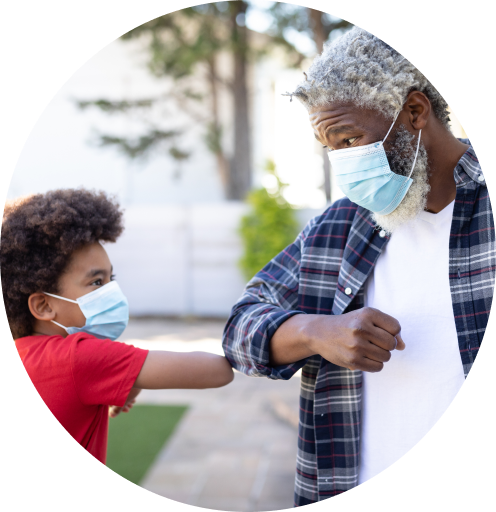Just like the flu, there are multiple different strains of COVID-19. Strains are different mutations of the same virus, kind of like dog breeds: golden retrievers and chihuahuas are both dogs, but they are hardly the same dog. This means that the vaccine you might have received in 2020 might not completely protect you from the newest strain. The updated COVID-19 vaccines that are released every year are designed to help fight these strains as they become infectious.
Your Health, Your Choice:
What You Must Know About the COVID-19
Vaccine
Welcome to EverThrive Illinois, your Champion for Health. Here, you will find reliable, trustworthy, and evidence-based resources to help you make informed decisions about your health and the health of those you care for.

Caring for yourself, your family, and your community during the pandemic may have been one of the most demanding responsibilities you have faced.
As COVID-19 continues impacting our lives, we are called to adapt and become more educated to make healthy choices for us and those around us. During this ever-changing and challenging time, we want to be Your Champion for Health.
Whether you are a parent or a caregiver, pregnant or recently pregnant, or a community or spiritual leader, we want to offer you our evidence-based information on how you can best protect yourself and others from viruses like COVID-19.
Did you know that we have lived and fought back viruses through vaccines for more than 200 years?
Fighting COVID-19 is not an exception.
Millions of Americans have safely received the COVID-19 vaccine since it became accessible in December 2020. Vaccines are continuously monitored to make sure they remain safe and effective.
The vaccines teach your immune system how to recognize and fight the virus that causes COVID-19. The vaccines never enter where your DNA is stored. Therefore, they do not change or interact with your DNA in any way.
The vaccines do not contain the live virus that causes COVID-19. So, they cannot make you sick with it. If you experience pain in the injection area, body aches, headaches, or fever lasting for a day or two, know that these are common symptoms, and are signs that your body is building protection against the virus.
Whether you have already had COVID-19 or not, getting vaccinated provides greater protection to you and those around you since they help reduce the spread of the virus. Because no vaccine is 100% effective at preventing illnesses, some fully vaccinated people can still get COVID-19. The COVID-19 vaccine is still the best available tool prevent you from developing long-term effects from the virus, also known as long COVID, and help reduce your risk of being hospitalized.
The Takeaways
download resourceCOVID-19 vaccines were developed quickly, based on research that has been underway for decades. There were no shortcuts.
Getting vaccinated is the best way to protect yourself and those you love. While you might experience common symptoms, the effects of the virus are much worse.
COVID-19 vaccines are available at pharmacies, doctors’ offices, and community clinics to everyone 6 months of age and older.
Expecting a baby might be one of the most joyful times in your life. You want to prepare and do your very best to provide, care for, and protect yourself and your baby.
The COVID-19 vaccine is safe and the most effective tool to protect pregnant individuals from the virus.

-
COVID-19 vaccines protect.
COVID-19 infections contributed to 25% of maternal deaths in 2020 and 2021 (Source). Although the Centers for Disease Control and Prevention (CDC) has not provided a formal recommendation for pregnant people to get the most updated COVID-19 vaccine, the Illinois Department of Public Health (IDPH) recommends that pregnant people get the 2025-2026 COVID-19 vaccine, as it remains the best way to protect yourself and your unborn baby from getting the COVID-19 virus and the complications that can result from a COVID-19 infection. (Source).
The 2025-2026 COVID-19 vaccine is recommended for people who are pregnant, planning to get pregnant, in the postpartum period (after pregnancy), or breastfeeding. This recommendation is also supported by the American College of Obstetricians and Gynecologists (ACOG).
Getting vaccinated against COVID-19 reduces pregnancy complications, such as severe health issues for the pregnant individual, preterm birth, and stillbirth.
The protection you receive from the COVID-19 vaccine during pregnancy is also passed down to your baby, keeping them safe after birth- when they are most vulnerable and not old enough to get the vaccine themselves (Source).
-
COVID-19 vaccines are safe
COVID-19 vaccines are safe and can be given at any point during the pregnancy. Once the vaccine has been injected into your arm, it quickly dissolves while strengthening your immune system to defend you from the virus. The vaccine never reaches your reproductive organs; therefore, it does not affect your natural fertility.
The Takeaways
download resource- Avoiding infection with COVID-19 should be a top priority for pregnant people.
- If you are pregnant, trying to get pregnant, or breastfeeding, experts recommend getting a COVID-19 vaccine.
- The potential risks (severe illness, preterm birth, and death) to you and your baby are much higher if you get sick with COVID-19 than they would be from the vaccine itself.
- Pregnant people with COVID-19 are also at increased risk for preterm birth (delivering the baby earlier than 37 weeks) and might be at increased risk for other poor pregnancy outcomes.
It is essential that you take steps to protect yourself from getting the virus. You can do so by getting a COVID-19 vaccine as soon as you can. You can also talk to your doctor, nurse, or midwife about getting vaccinated against COVID-19, navigating pregnancy, your birth plan, and how to best cope with stress and anxiety related to COVID-19. Do not delay getting emergency medical care if you need it.
As a parent, choosing to vaccinate your child is a very important decision, and it may feel more confusing than ever due to mix messaging and widespread misinformation. EverThrive Illinois is here to give you resources that will help you be well informed to make confident decisions about your child’s COVID-19 vaccination.
Getting vaccinated against COVID-19 is still the best way to protect your child against the harmful effects of COVID-19. Parents are encouraged to talk to their child’s health care provider to support their decision-making process about COVID-19 vaccination for their children.

-
IDPH recommends that all children ages 6 through 23 months receive the 2025-2026 COVID-19 vaccine even if they have had a previous COVID-19 infection in the past.
Additionally, IDPH recommends that children 2 to 17 years of age who have at least one underlying risk factor for developing severe COVID-19, have a weakened immune system, and/or are in special situations receive the 2025-2026 COVID-19 vaccine. Special situations include:
- Children who have never been vaccinated against COVID-19.
- Residents of long-term care facilities or other group living places.
- Infants and children who live with people who are at high risk for severe COVID-19 illness.
IDPH also recommends that children 2 through 17 years of age without underlying risk factors receive the 2025-2026 COVID-19 vaccine if their parents or caregivers want to provide them with protection against COVID-19. These COVID-19 recommendations are supported by the American Academy of Pediatrics. (Source)
Children aged 6 to 23 months may need multiple doses of COVID-19 vaccines to be up to date, depending on whether they have completed the primary COVID-19 vaccine series. All vaccine doses should be from the same COVID-19 vaccine brand.
Everyone age 2 years and older should get 1 dose of the 2025-2026 COVID-19 vaccine to protect against serious illness from COVID-19.
Children who are moderately or severely immunocompromised will need to get multiple doses of the 2025-2026 COVID-19 vaccine.
Your child’s health care provider can help determine how many doses of the 2025-2026 COVID-19 vaccine they need and how far apart the doses need to be taken.
IDPH recommends that children ages 6 months through 4 years receive the Moderna vaccine. Children ages 5 through 11 years may receive the Moderna or Pfizer-BioNTech. Those who are 12 years and older may receive the Pfizer-BioNTech, Moderna, or Novavax vaccine (Source).
All vaccines are available to children 6 months and older.
Kids play a role in controlling the spread of COVID-19, so the more people vaccinated will help slow down infection rates, and there will be fewer chances for the virus to turn into a new strain.
Children can develop long-term effects, also know as long COVID, or even death from COVID-19. To learn more about COVID-19 long term effects, copy and paste the following link into your web browser: https://www.cdc.gov/long-covid/about/index.html
Your Tools and Resources:
Like everything we do at EverThrive Illinois, we want the content on this page to be a source of information and support. Considering various sources, questioning, challenging the information you consume, and assessing it with experts and those you trust might be the best, most responsible way to understand, face, and overcome this crisis.

- 1006 S Michigan Avenue, Suite 200
Chicago, IL 60605 - Phone: 312.491.8161
- Fax: 312.491.8171
- Email: info@everthriveil.org
- Web: https://www.everthriveil.org/
Helpful Links
Citations
- [1] https://dph.illinois.gov/content/dam/soi/en/web/idph/documents/topics-services/diseases-and-conditions/respiratory-disease/2025-26-respiratory-immunization-recommendations.pdf
- [2] https://publications.aap.org/pediatrics/article/doi/10.1542/peds.2025-073924/203222/Recommendations-for-COVID-19-Vaccines-in-Infants?autologincheck=redirected
- [3] https://www.acog.org/clinical/clinical-guidance/practice-advisory/articles/2020/12/covid-19-vaccination-considerations-for-obstetric-gynecologic-care
- [4] https://www.acog.org/news/news-releases/2025/08/acog-releases-updated-maternal-immunization-guidance-covid-influenza-rsv?utm_medium=social&utm_source=linkedin&utm_campaign=acog2025-news
- [5] https://www.webmd.com/vaccines/covid-19-vaccine/video/video-covid-mrna-vaccine
- [6] https://www.chop.edu/covid-19-vaccine-program
If you are still deciding if you will get the COVID-19 vaccine, stop and ask yourself: from the two available options – getting the COVID-19 vaccine shot or not – which one do I want to remember as the one that has benefited me, my family, and my community? Make it the one decision that you would be proud to share and talk about with others.
We are frequently reviewing and updating this information to reflect the most current data available and provided by subject matter experts on the topic of immunization. Last updated, October 2025





